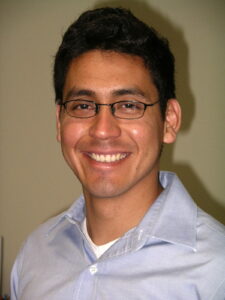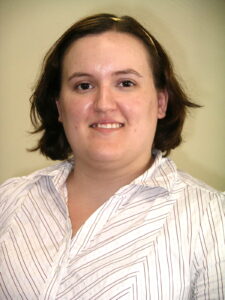Cassie Ng
Research Intern
Testimonial Video
Amanda K. Peterson
Research Intern
This dynamic internship offers a very unique opportunity to advance your education and network with others. Here is what some of our student interns have to say about their experience:
“Although I have been at the center for Homicide Research only under two months time, I have been assigned a great deal of responsibility. For instance, I represented the Center at the University of Minnesota Job and Internship Fair, and will be sitting on a panel and presenting at the MSSA conference at the end of March. Dallas is very interested in giving interns the opportunity to lead and expand in the different fields of their interests, and mentoring this growth from start to finish.”

Jose Palma
Research Intern
“I was given the opportunity to work as a research intern for the Center of Homicide Research (CHR) during the summer and fall of 2009. Prior to my internship at CHR, most of my experience was bound to two research assistantship positions through the Department of Psychology at the University of Minnesota. CHR presented the challenge to further sharpen my research abilities and apply these skills to analyze homicide incidents from a scientific point of view. In the process of working with crime data, I learned the fundamentals of how to collect, manage, and infer information from empirical homicide data. Most of my work took place in the design and development of the Missing Homicide Victims Database. Due to the nature of homicide cases, dealing with crime data at times could become unsettling and an overwhelming experience. The principal researcher understood the effects that working with homicide information might cause for the interns. He provided emotional and social support if required and was always accessible to answer any questions.
While participating in these activities I worked with a large range of students some who were working toward law degrees, forensic degrees, or other graduate degrees and undergraduate degrees from equally numerous backgrounds who would provide several perspectives to the discussions that were held. These perspectives allowed me to develop more as a person and to see these issues from a different angle.”
 Katherine Ephgrave
Katherine Ephgrave
Research Intern
“When I first heard of the Center for Homicide Research, I was excited, but after the second day, I wasn’t sure whether I would come back to complete the internship. Sitting here on my final day, inching closer to my final hour, I find myself reflecting on the many things that the Center has taught me, and I am not sure whether I will want to stay away once my time here is over.
When I applied for this internship, I was fascinated by the possibility of focusing on homicide, and learning to understand patterns that could help prevent future homicides. Homicide was something that I had always had an interest in, but never had any organized way to investigate. Spending the better part of a school year focusing on learning the fundamentals of law had left me with a strong desire to spend some time looking at actual criminal behavior, not just how statutes are written and interpreted to control crime. The Center seemed like a natural fit for me, as a place where I could gain new information about homicide that I could use in the practice of law to be more effective in prosecuting offenders.
So, with high hopes, I showed up for my first day of work. Like any job, I started out with paperwork and manuals and office procedures, but it quickly changed to a very different type of orientation than I was used to. I was given a handout of the scientific method, which I had studied many times over in elementary school at a basic level, in further depth in middle and high school, and finally in college in great detail as part of my education in psychology. I skimmed the page and said that yes, I was familiar with it.
What followed was the first of many confrontations in which I was forced to look critically and closely at what I was doing, and to find out whether I really knew the concepts or whether I was just vaguely aware of them. This was a jarring experience, and not one that I responded to well. I resented that (I thought) it was implied that I didn’t know something because I couldn’t recite it from memory, and because I couldn’t identify a missing step because I classified it differently. I was angry because I felt that I was being made to look stupid, which I knew I wasn’t. I had to force myself to return to the office the next several days.
As the internship progressed, however, I began to realize that the confrontations weren’t pointless exercises designed to make me feel small, and that my responses weren’t being judged as stupid and naive. The purpose was to make me learn, and to prepare me to approach the work being done at the Center in the way that would benefit both myself and the data that I was collecting. The reason I had to understand the scientific method clearly was because I had to be able to respect and understand the data collection process. Rather than taking for granted that I wouldn’t make mistakes, I needed to conform to a procedure designed to prevent them. The more I was able to follow set procedures and document every step I took, the more I was able to understand why deviating from them, even when done with good intentions, would be poisonous to the research.
As I was struggling to work with the restraints of procedure instead of against them, I was also struggling to find a way to deal with the subject matter I was studying. For the most part, my problems were not with the devastating details of the crimes I was researching. I was fortunate in that I had already had some experience with approaching difficult situations and ideas with a clinical distance. I was able to search for information on brutal cases and catalog it in careful detail without being consumed by, or even really allowing myself to acknowledge, the horror and tragedy of what I was recording.
This is not to say that reading those cases day after day was always easy. Everyone has bad days, and has certain cases that cut through their defenses and threaten to overwhelm them. At those times, the atmosphere of the Center is crucial to the wellbeing of the students working in it. I was reminded that nightmares go away if you force yourself to examine them, rather than shoving them down to the corners of your mind, where they can attack you by surprise. I learned that collaboration generates far more knowledge than competition, and that humor can help us cope with things we would never be able to process alone.
I also struggled with the subject matter on an intellectual level. The things I was being taught were difficult for me to accept. Because I didn’t want to believe what I was seeing, I spent a great deal of time thinking of alternative explanations, and recited answers in line with the Center’s theories while criticizing them in my head. The most difficult part of the entire experience was admitting to myself that I was wrong. It took many cases, but after several weeks I realized I could predict details of a homicide based upon only a few details. I could start to see behavioral clusters, indicators of particular homicide syndromes, and patterns that illustrated which offenders acted in certain ways, and why. At that point, I realized that, in order to truly understand homicide in any useful way, I was going to have to confront the things that made me uncomfortable, and find a way to understand and accept them.
At the end of my internship, I was allowed to break away from the cases for a while, and focus on some sociological research that would be useful in considering homicide. I spent several days poring over books and websites, fascinated by how the concepts I was learning about played out in homicide investigations and the perception of homicide in the public consciousness. I also got to examine a case that showed me how serious the research was, and how easily it could destroy people’s lives. Because the research came at the end of my internship, I was able to apply the critical thinking skills I had cultivated. I presented my research to two groups of my colleagues, and was rewarded with a variety of engaging questions and discussions that strengthened all of our understandings of how the concept was related to our work, and even how it was related to our everyday lives.
Some people might argue that, as a law student, I should have spent my summer learning to practice law by interning with a firm, or the offices of the government prosecutors or defenders. That is an important pursuit, and one that I will necessarily engage in as my career advances. I strongly disagree, however, that spending time in the courtroom or doing legal research is the only way to facilitate a student’s growth as a lawyer. I know that the skills I have learned this summer, both those that are homicide specific and those that are more general, will help me look critically at the world around me, in the classroom, the courtroom, and anywhere else I go.”
INTERNSHIP OPPORTUNITIES
The Center for Homicide Research offers one of the finest internship programs in the United States. Distanced-based electronic internships begin in Fall of 2020. Qualifying students come from undergraduate, graduate and law schools.






Recent Comments